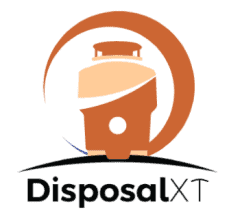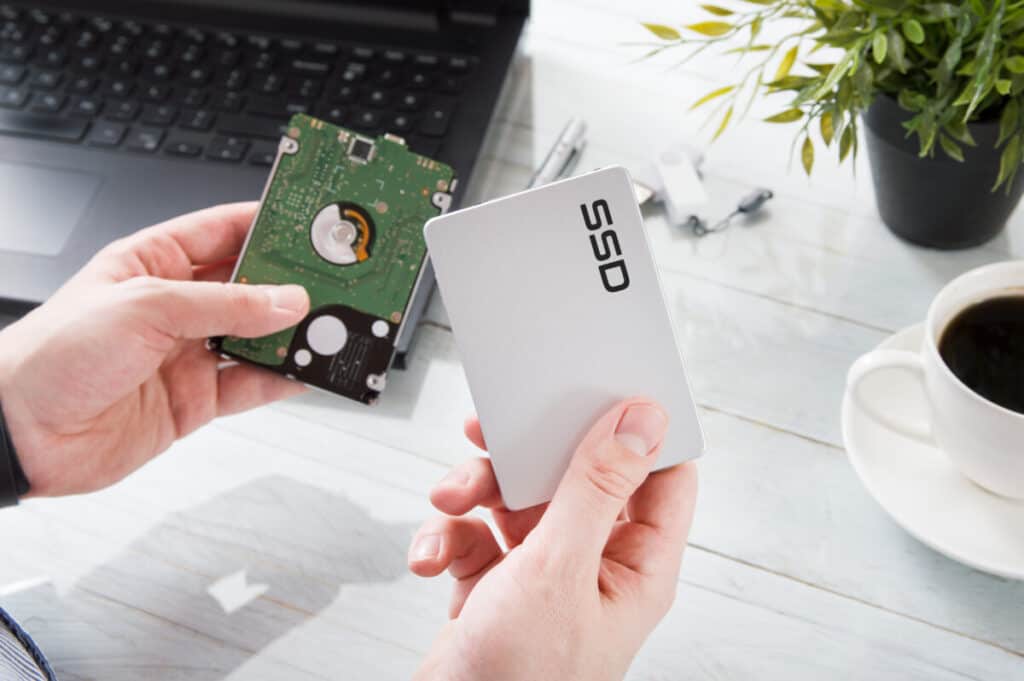
In a modern world that is always on edge, cyber security and the protection of personal information are vital. Part of that security is fully clearing sensitive information off of computer hard drives.
To properly dispose of a hard drive, it must be completely cleared or destroyed beyond recovery. A traditional hard drive must be overwritten or completely demagnetized. SSDs can be physically destroyed or wiped. A drive that does not contain very sensitive data can be formatted and donated.
Until the data on the hard drive is completely and securely cleared, it should not be disposed of. Keep reading below to learn how to dispose of hard drives safely!
How to Dispose of a Hard Drive
Hard drives can be a serious security risk if they’re disposed of incorrectly, but they’re also a valuable donation and great recycling material when they’re fully cleared. The key is clearing them appropriately for the level of security you need. Whether you recycle them or donate them, you want to be sure that no Social Security Numbers, medical information, dates of birth, or other personal information are still on the drive.
Donating the Drive
Once a drive has been cleared appropriately, it can be donated to a school, a charity, or someone who is rebuilding computers. This can benefit many people! Some of those people include:
- Low-income adults or youth
- College students
- Young people learning to build computers
- Refugee aid groups
- Veterans
- Hospice
- Senior Citizen Centers
- International Aid Charities
- Shelters
- Disaster Relief Agencies
If your hard drive would be safe to donate after clearing, which is the case for many casual use home computers, it would be valuable to all these listed groups and more. Since many people believe that hard drives need to be physically destroyed, they are a rare donation.
Upcycling the Drive
“Upcycling” is a fancy way of saying “using old stuff to make new stuff.” In the case of hard drives, that often means turning it into an external hard drive or using it to build a new computer from other old parts.
You can upcycle the hard drive yourself, which would save you the effort of totally clearing it, or you could clear it and donate the drive to be upcycled by someone else building a computer.
Recycling the Drive
A hard drive should never be disposed of in the trash. Even if you have destroyed it completely, you should dispose of the hard drive by donating it to be recycled. Besides being better for the environment, since hard drives can leak heavy metals like mercury or lead, it is actually illegal to throw away electronic waste across most of the United States!
Recycling through a certified recycler is actually one of the best ways to be confident that your secure data is destroyed. Since the hard drive will be completely wiped and dismantled, no sensitive information will be recoverable. Recycling keeps hard drives out of landfills, heavy metals out of the soil, and your data out of the hands of thieves.
If your hard drive is dead, and you are unable to clear information because of this, recycling through a certified recycler can give you some peace of mind.
How to Clear Data from a Hard Drive Before Disposal

In spite of what many people believe, there’s more to safely disposing of a hard drive than smashing it. You need to make sure it’s been wiped clean before passing it on to new owners or recycling services.
If you don’t clear data correctly, you risk having your personal information stolen by thieves. Make sure you’ve followed the correct steps for your hard drive!
“Spinning Disk” Hard Drives
If you ask people for advice on clearing a classic “Spinning Disk” style hard drive, you’re going to hear outdated misinformation. You cannot just pass it behind a speaker to wipe it. You cannot use a microwave battery to wipe it. Most importantly, you can’t use a hammer and nails to destroy it and hope it worked. All of those things will still leave data readable on your hard drive!
Hard drives actually contain a magnet already. This magnet is a vital part of how hard drives work since it magnetizes or de-magnetizes the strip inside the hard drive to create the data. It won’t be impressed by the magnets you have around your home.
To wipe a hard drive using magnets, you need to put it through a machine called a demagnetizer. This demagnetizer sends a massive electromagnetic field (EMF) through the hard drive, wiping it completely. Since you probably don’t have a demagnetizer on hand, you should look into another option.
A Department of Defense (DOD) wipe is one method trusted by professionals around the world. This program overwrites the hard drive multiple times, turning that organized set of ones and zeroes into an unintelligible mess. Data would be incredibly hard or impossible to retrieve if this program is done correctly. Anyone using a hard drive in schools, in medical fields, or on a computer that holds any kind of secure information should follow this procedure.
For private computers that are mainly used by children, or that are going to be safely recycled soon, a less intense overwriting program would work.
Shredding is the ultimate insurance when it comes to hard drives. After the drive has been rewritten, ideally using a DOD wipe, shredding the hard drive makes it truly unusable.
SSD/Solid State Drives
While not technically a hard drive, it counts enough that we’re going to walk you through clearing it. One of the nice things about SSDs is that they’re much easier to clear than other hard drives and are much easier to destroy. One cycle of a wiping program will clear an SSD, and hitting it hard with a hammer will make it unusable.
Isn’t that easy? Advancing technology makes it much simpler for an average person to keep data safe.
What Happens if a Hard Drive is Not Cleared Correctly?
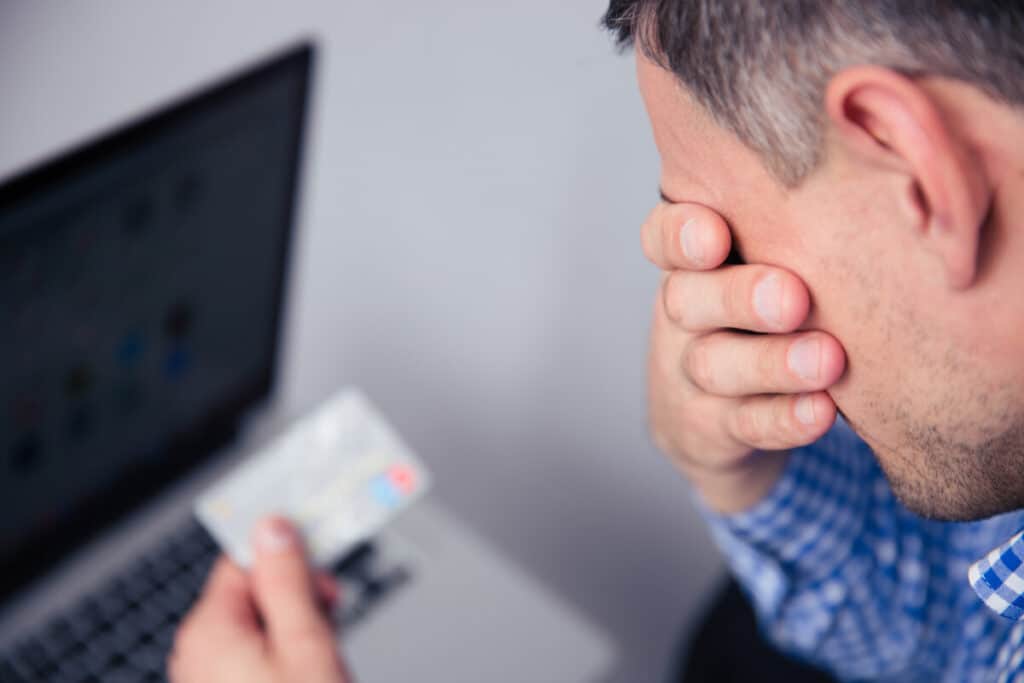
If a hard drive is not cleared correctly, some of your data may still be accessible. Here’s why that happens.
Old hard drives have a disk drive/spinning disk. This works like magnetic tape. When you read or write something on a hard drive, you’re magnetizing or de-magnetizing dots on this hard drive and creating ones and zeroes in a file.
When you delete a file, it doesn’t delete the ones and zeroes. It just deletes their addresses. A truly motivated hacker can find all the files without their addresses, gaining access to your personal information. Even worse, an incorrectly formatted hard drive from a business or medical center can have hundreds or thousands of pieces of sensitive information on it. All of those are vulnerable when a hard drive is cleared incorrectly!
Rewriting the Hard Drive Incorrectly
Rewriting a hard drive is a great idea, but doing a half-hearted job means that a really motivated hacker or thief could still get that sensitive information.
A rewriting program like DVAN writes random ones and zeroes so it physically overwrites all of that data. This is a good thing, but it needs more. To do it truly effectively, like a DOD wipe, the program will need to rewrite the drive seven or eight times. When that is done correctly, you won’t even get file names off of it. All that will be on the drive is a mess of random ones and zeroes, no intelligible data.
You can still physically destroy it for good measure, then recycle it. That hard drive will be gone for good.
Physically Destroying the Hard Drive Incorrectly
Taking a hammer to a classic spinning-disk hard drive will not destroy the data. Even using a specialized tool will not get the data off it. The goal of physically destroying the drive is to make it impossible to recover the information from the drive, and that is surprisingly difficult to do.
Since the data is literally written on the disks and the other parts of the hard drive, anything that leaves those partially intact will leave data. Those fragments of data can contain information that you do not want to share with the world.
Hitting the hard drive with a hammer will not completely destroy the data. Dunking the hard drive in the water might not destroy any of the data. Drilling holes in the hard drive will leave holes in the data, but anything left intact will be readable. To physically destroy a hard drive, you need a special tool like a shredder specifically designed for hard drives.
Please do not try to burn your hard drives, since that is a waste of materials and potentially bad for your health. Hard drives contain a lot of materials that you should not be inhaling.
If you want to have some fun while destroying your hard drive, some software engineers and tech support directors have been known to take hard drives to the shooting range. Once the hard drives have undergone a DOD Wipe, overwriting all the data, they can be used as target practice for a high-caliber gun. This should not be the only thing you do to destroy it, but it can be a good way to let off steam as a team after a day of clearing hundreds of hard drives.
Can I Just Smash the Hard Drive?
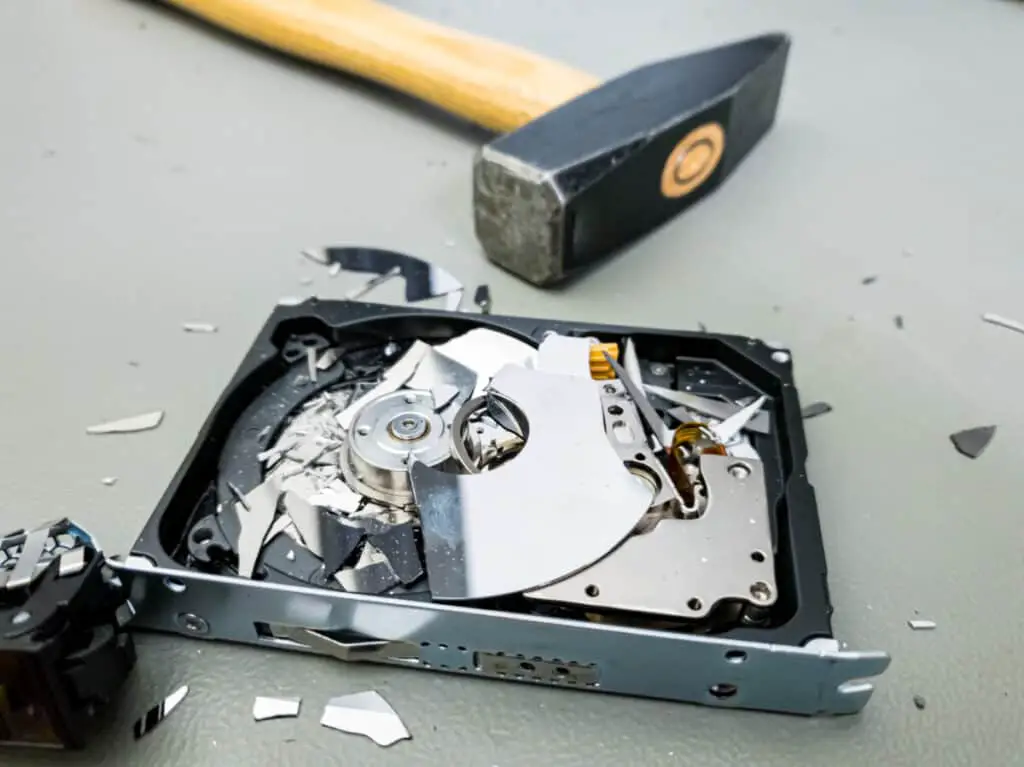
You cannot just smash your hard drive to remove and destroy the information stored on it. If you smash your hard drive without wiping it, data can still be recovered from the internal parts of the hard drive that were not physically destroyed.
The same thing applies to hitting it with a hammer, running it over with your car, dunking it in water, rubbing magnets on it, or poking it full of holes. Unless you’ve broken it open and physically scratched all the disks after overwriting it, physically destroying the hard drive will not be the most secure way to dispose of it.
The exception is putting your hard drive through a shredder. Hard drive shredders will obliterate the hard drive, leaving you with peace of mind. Recycling it after shredding is the final step to feeling secure in your data protection.
After My Hard Drive is Destroyed or Cleared, Can I Throw It Away?
You cannot throw away a hard drive or most other electronics. Laws across most of the U.S. prohibit electronic waste in trash cans or landfills. Recycling is great for the environment and the tech industry, but it’s also the only way to actually legally dispose of your old hard drive.
Hard drives contain metals like lead and mercury, and they’re made of materials that could take millennia to break down in a landfill. Since tech waste is such a huge contributor to trash, and since so much technology is made of precious materials that are hard to find and replace, recycling tech is a valuable investment for many companies.
Instead of throwing away your hard drive, you can mail it to a company that will recycle it or you can bring it to a local company that would be happy to help. Earth911 has resources for tech recycling in their computer section.
Recycling a Dead Hard Drive
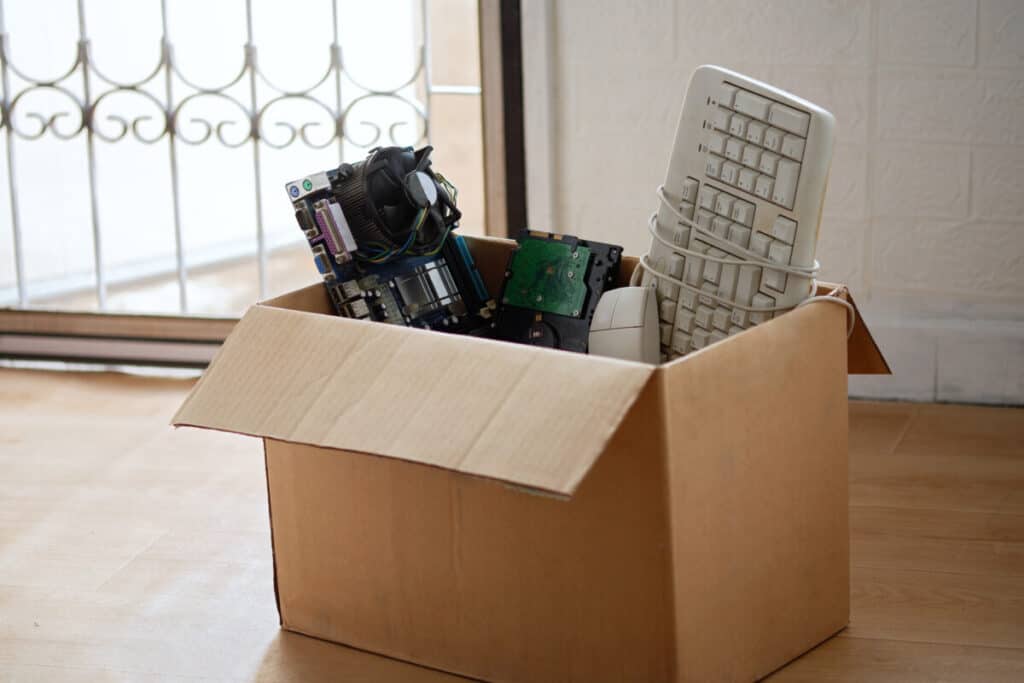
Recycling a hard drive is the best thing you can do for the environment, your personal data security, and the future of technology. Beyond being a good habit, it has some immediate benefits and is incredibly easy. You may not always have access to recycling bottles, cans, or glass, but you definitely have access to recycling for hard drives.
It is easier for many people to recycle a hard drive than it is to recycle a can. It’s crazy, but it’s true! Here are some of the benefits of recycling your hard drives, and why it’s so accessible.
- It protects your data by completely destroying the hard drive
- You know where the hard drive is going, keeping it out of the wrong hands
- Recycling hard drives/tech keeps toxins and heavy metals out of the water table and out of landfills
- It puts materials that are in short supply, like gold and other precious metals used in tech, back into circulation
- It is the most secure way to dispose of a hard drive if you don’t know what you’re doing/aren’t able to yourself
This might not be what you expected, but these benefits of recycling hard drives are real. Positive consequences are always nice!
Related Topics:
If you like the article above, here are some other similar articles you should check out!
